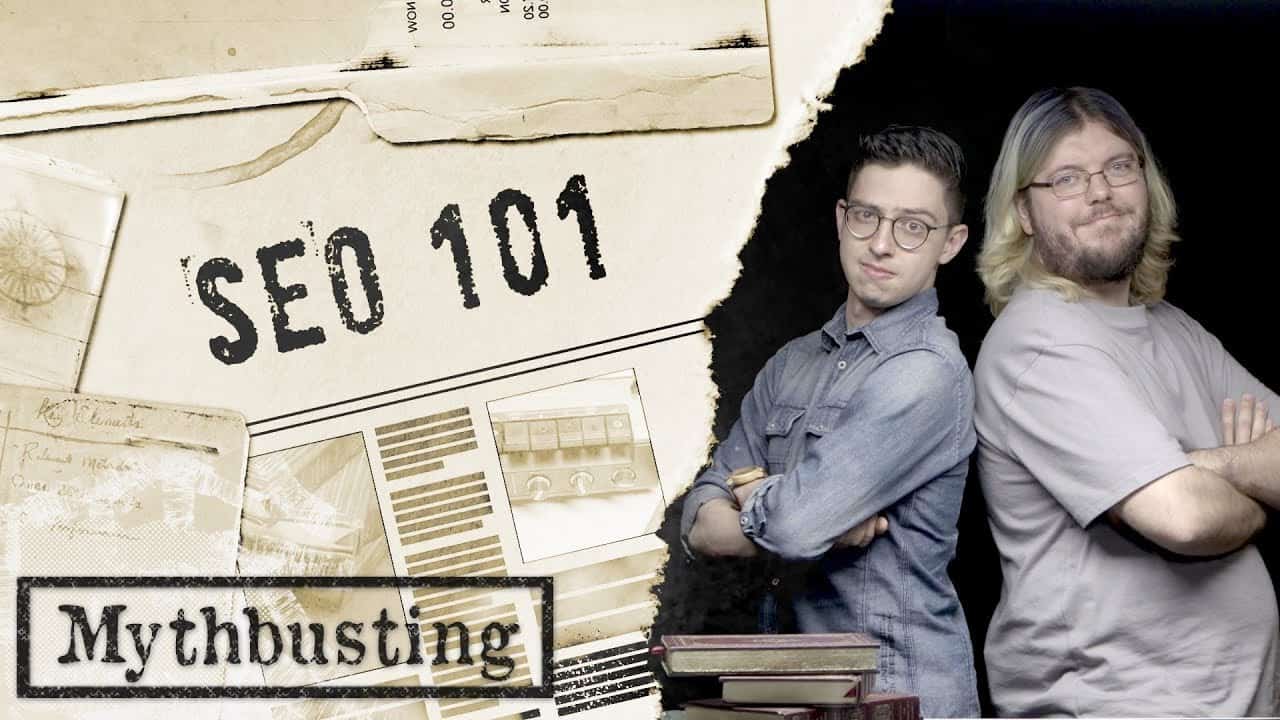SEO Mythbusting 101
MARTIN SPLITT: If you hear about
SEO, what comes to your mind? JUAN HERRERA: Oh, well keywords,
getting the content right, sometimes a good H1 title. That's probably the first
thing that comes to my mind. MARTIN SPLITT: Those
are my first things. JUAN HERRERA: But also a
lot of myths and things I don't know about. [MUSIC PLAYING] People say a lot
of things out there about how to make your website
stand in the top result. But I don't really know how
to achieve that, you know? MARTIN SPLITT: Right. Fair enough. That's a really good
question, how to achieve that. And I think that's a perfect
introduction into what we're trying to do here.
We're trying to
bust these myths. What can I help you with? What are the questions
that come to your mind? JUAN HERRERA: OK, so let's
start with something simple. What's a search engine? MARTIN SPLITT: All
right, so a search engine is a platform or service
or a program, whatever you want to call it,
that basically goes through the internet content
and tries to catalog it. It works a little bit like
in the library, right? So you probably go to a
library and ask the librarian, where can I find a
book on topic X, right? That's what you do.
And then normally,
it doesn't take you to basically go through
all the books in the library. You just get the right books. And that's what search
engines do for you. We find the right
content for your purpose. JUAN HERRERA: All right. But when he's heard
of search engines, I also heard this
word called crawling. Is that a thing? MARTIN SPLITT: That's a thing. So the way that we
are doing this– or search engines do this– is by first going through
the entire internet. And we have links from
one page to the other. So we are using that. We start somewhere,
with some URLs, and then basically follow
links from there on. So we are basically
crawling our way through the internet one
page by page, more or less. And then once we have these
pages, have found them, have grabbed the content
from the internet, we need to understand it.
We need to figure out
what is this content about and what purpose does it serve? So then that's the second
stage, which is indexing. So then we figure out, so
this page is about ice cream. This page is about
ice cream in Miami. This page is about marmalade,
and stuff like that. And then the last step is
if you type something in, you don't type in I want
this particular thing here. You just go like,
I need ice cream. Ice cream online
Medillín, right? JUAN HERRERA: Yes, you got it. MARTIN SPLITT: So we then
basically look into our index and find the ones that
are serving this purpose. And then we try to
figure out which is the one that serves this
purpose as perfectly or best. And then we rank these
higher than the others and show you the examples
that we found from the index. JUAN HERRERA: So how
do you know which one is– which results are
more relevant to a given user? MARTIN SPLITT: That's
a really good question. We have over 200
signals to do so.
So we look at things like the
title, the meta description, the actual content that you've
got on your page, images, links, all sorts of things. It's a very complicated question
to answer what ranks you best. But yeah, we look at
a bunch of signals. JUAN HERRERA: Now,
if you could give me, like, top three things
that I should consider, what would that be? MARTIN SPLITT: Right. So us being
developers originally, you probably want me to say,
oh yeah, use this framework or use that framework. JUAN HERRERA: Yeah. MARTIN SPLITT: That's
not how it works. You have to have
really good content. And that means you have
to have content that serves a purpose for the user.
It's something that
users need and/or want. Optimally, they need it and
want it, like ice cream. So if your content says
where you are, what you do, how you help me with what
I'm trying to accomplish, that's fantastic. If you just have
a page that says, we are a fantastic
company and we have plenty of products,
that's not serving a purpose. So you want to make sure to
serve the purpose of the people who you want to attract
and who you want to interact with your content. And you want to make sure
that you're using words that I would be using. If you use a very specific
term for your ice cream, let's say like smooth cream
5,000 or something like that, I'm not going to search for that
because I don't know about it. I'm just going to go
like, I need ice cream. It's good to mention it
somewhere so that I know, if I look for that
trademark, I find it as well.
But if I'm exploring
ice cream around me, I don't know what particular
ice cream there is. If there's a specific
brand, fantastic. But that's not what
I'm looking for. So speak the language
that I'm using as a user. JUAN HERRERA: So you're
saying more like a pitch. MARTIN SPLITT: It
is like a pitch.

JUAN HERRERA: Like
an elevator pitch. MARTIN SPLITT: It's
like an elevator pitch. JUAN HERRERA: Right. MARTIN SPLITT: Exactly. You wouldn't– when we two
meet and you have a fantastic product or I have a
fantastic product, I wouldn't go like yeah,
the blurb master 5,000, it's fantastic. And you're like– JUAN HERRERA: Yeah, it
doesn't say anything. MARTIN SPLITT: What
does that do, right? So do that. Do an elevator pitch and
help us put you in contact with the right people. JUAN HERRERA: OK, so content
is number one priority. Could you mention
another two things that are important
for this, [INAUDIBLE]?? MARTIN SPLITT: Yes. You're going to love them
because they're technical.
So the second biggest
thing is make sure that you have meta tags
that describe your contents and have a meta description,
because that gives you the possibility to have a little
snippet in the search results that let people find out
which of the many results might be the ones that
help them the best. And have page titles that
are specific to the page that you are serving. So don't have a
title for everything. The same title is bad. If you have titles that
change with the content you're showing, that is fantastic. And frameworks have
ways of doing that, so consult the documentation. But there is
definitely something that helps with the content. And the last bit is performance. JUAN HERRERA: I've heard of it. MARTIN SPLITT: Right? JUAN HERRERA: Yeah. MARTIN SPLITT:
Performance is fantastic. We are talking
about it constantly. But we are probably
missing out on the fact that it's also good for
being discovered online. JUAN HERRERA: So
performance is not just making my website
faster, but it's also making my website more
visible to others? MARTIN SPLITT: Correct. Because we want to make sure
that the people clicking on your search result is
like clicking on your page, getting this content quickly.
So that's one thing that we
want to make sure as well. So that's one of the many
signals that we are looking at. But also, it just
helps your users. They get happier. If I want ice cream really badly
then I get the page quicker, that's fantastic. So if you want to
look at performance, I highly recommend looking into
hybrid rendering and service side rendering if
you can, because that gets the content quicker to
the users usually, right? Also, you might have bots
that don't run JavaScript. So Googlebot does that. But not everyone else
does it, necessarily. So you want to make sure
to probably figure out something like dynamic
rendering if you don't want to make code
changes, because I understand we are all pressed for time.
We have lots of
bugs and features to fulfill and work through. So if you can't change the
code, dynamic rendering might be something that gets
you there if there's rendering issues with your content. But besides that, I
would say definitely look into performance
optimization. Get the content quicker. Get the first contentful
paint in there quicker. Optimize your servers. Optimize your
caching strategies. Make sure that
your script doesn't have to run for 60 seconds to
fetch everything that you need. JUAN HERRERA: Oh, no. MARTIN SPLITT: Yeah, so
those are things that you should definitely look into. And I guess performance
is something that pretty much everyone
in the developer community is looking into. JUAN HERRERA: Certainly, yes. Or they should, at least. MARTIN SPLITT: They should. I hope that they do. JUAN HERRERA: OK, so we already
discussed all these basics around SEO and search engines
and how to position my website in the top search results.
Now the question is, why is
it so important for companies to rank in the top results? MARTIN SPLITT: Right, so
you're a web developer, right? JUAN HERRERA: Yes. MARTIN SPLITT: You have
built stuff on the internet? JUAN HERRERA: Yep. MARTIN SPLITT: Do you
want people to use it? JUAN HERRERA: Certainly, yes. MARTIN SPLITT: Certainly, right? So in order to make sure
that people can use it, they have to know about it. And unless you are probably
one of the really big players, you might not– and even for the big players,
if they launch something new, you might not know about it. And you're not looking
specifically for products. You're looking for something
that serves a purpose for you. I want to know how I built
this thing with a framework. I want to know where
to find the best ice cream in the place I am in. I want to find the cutest
dogs and puppers online. So I have a purpose. I don't know who serves
this purpose, necessarily. So if you built the best ice
cream PWA ever in, let's say, Medillín? Is that how you pronounce that? JUAN HERRERA: That's right.
Perfect. MARTIN SPLITT: So if you built
the best PWA to order ice cream online in Medillín, then
I don't know about that, especially if I
come as a tourist. But if I type it
into a search engine, like order ice
cream in Medillín, and then it goes like, hey,
this PWA does this trick, you want to be the first
or the first couple of, because I'm not going to go
to page 99 and go like oh yeah, this might be the perfect thing,
because Google and other search engines are trying to figure
out what is the best for this purpose and then show
me those up front.
And then I might pick from
those because normally, they're pretty good. JUAN HERRERA: I
think that covers all the questions I have. MARTIN SPLITT: Fantastic. JUAN HERRERA: Perfect. MARTIN SPLITT: So you feel
ready to build stuff that is– JUAN HERRERA: Oh, certainly. MARTIN SPLITT: Excellent. JUAN HERRERA: I can't wait. MARTIN SPLITT: That is so cool. Thank you so much
for being here. JUAN HERRERA: Martin, thank you. MARTIN SPLITT: Thanks
for being my guest. And I hope that this helps
other developers as well. And developers and SEOs
can be friends, I think. JUAN HERRERA: I think so. yes. MARTIN SPLITT: I think so. Thank you. [MUSIC PLAYING] Oh, are we still on? Please stay tuned for another
episode of "SEO Mythbusting." Next time with Suz Hinton, we'll
talk about what is Googlebot? So come back again and
watch what happens..



